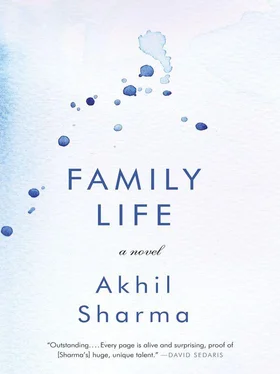The nursing home stood on one side of a road and opposite it was a hospital. The two were connected by a bridge that looked like a plastic straw. At five o’clock, my mother and I lifted Birju from his bed. My mother slipped her arms through his underarms, and I held him around the knees. We swung him into a wheelchair and rolled him through the hallways onto the bridge. There, facing out, our image reflected back at us, we waited for my father to come from the train station. He worked in New York, and each morning he took a train into the city. That evening, when my father arrived, he said that he had seen us hovering above the road, snow falling past us.
That first day, he wasn’t drunk. But almost every day after this, he was. Sometimes he would smell of beer and other times of scotch. “Another bastard day,” he would say bitterly in Birju’s room.
In the beginning, my mother remained silent about my father’s drinking. She looked shocked. I could tell she wasn’t speaking because she didn’t want to say anything in front of me. I knew that this meant I, too, was supposed to pretend not to see, and yet I wasn’t sure whether this meant I should act busy and energetic so that it would appear that I was too frantic to be able to see anything or whether I should act as I always had.
Later, after perhaps ten days, my mother began to acknowledge that my father was drinking. First she was sarcastic. She muttered under her breath. “You are going to kill someone driving this way.” My father ignored her.
Then she became openly angry. Wet-eyed, she shouted at him. “You have a son like this, and what do you do? Drown yourself.”
MY PARENTS HAD moved to Metuchen because it was one of the few towns in New Jersey that had a temple. A month or so after we arrived, my mother combed my hair and took me with her to see the pundit. It was a Tuesday night, one of three evenings when he sat at the temple, another converted church with the musty American smell and a large idol-lined chamber with a refrigerator in the back for the ceremonial milk and bananas.
My mother explained our situation to the pundit. “Birju is in a coma,” she said, though Birju’s eyes were open and he was not in a coma, but was brain damaged. “The doctors say that they don’t know what can happen. He could wake tomorrow.” I wondered why she was saying this. I guessed that it must be because people are more likely to help if they think there is hope. If there isn’t any, they might try to avoid us, because who wants to be around someone depressing? “I go every morning to the nursing home. His father comes in the evening. I am so glad there is a temple in town.”
The pundit stood before us, leaning slightly forward. He was a handsome man in his thirties, tall, broad shouldered, with a thick mustache. It was strange to come to a pundit for help. This was not what one would have done in India. In India, pundits are not counselors or spiritual leaders, but functionaries, performers of rituals, the equivalent of low level government clerks who put stamps on papers and who always have their hands out for a bribe. My mother used to speak of pundits with disgust. “Nobody has ever seen the back of a pundit’s hands,” she would say. Once, she told a joke about a pundit who fell into a deep hole. People reached down into it and said, “Give us your hand.” When they said this, the pundit crossed his arms and began pouting. An old man then pushed his way to the front of the crowd. He said, “Is this any way to talk to a pundit?” He reached into the hole and said, “Take my hand.” Immediately, the pundit grabbed it.
I felt contempt for the pundit because he was a pundit. I also felt contempt for him because he was not a real one. Mr. Narayan was an engineer who volunteered at the temple. In the seventies through the mideighties, when most of us prayed in one another’s homes, even communities that had managed to buy or build a temple could not afford to pay a pundit, and so the pundits tended to be volunteers, usually especially pious men who, because of their piety and because of a reputation for virtue, were asked if they would be willing to lead ceremonies and sit in the temple on certain nights. In India, it was unheard of for a pundit to visit parishioners who were sick, or to offer help to families in trouble. These volunteer pundits, though, perhaps because they were just very decent people, behaved like the Christian pastors in the hospital.
A few days later, Mr. Narayan came to visit us in Birju’s room. It was a cold and sunny Saturday afternoon. It had been important to get him to come during the day so that my father would not be drunk. Mr. Narayan sat in a chair along the side of the hospital bed. He did not seem to care that Birju had his eyes open and so was not in a coma — perhaps the word coma did not mean something specific to him? Mr. Narayan sat up straight with his hands in his lap. It was strange to have him there. I had grown so used to our being alone with Birju that I had begun to feel that my brother was no longer real to the outside world. Yet Mr. Narayan’s presence made Birju feel less important — the fact that seeing Birju did not cause everything to change for Mr. Narayan made it seem like what had happened was not as important as I thought it was.
Mr. Narayan had a bright, modest smile. He appeared eager to please and nodded at everything my parents said. His friendliness irritated me. “Why should I be proud of what I am doing?” my father said. “I am not glad to be doing it. I hate doing it.” Mr. Narayan nodded, as if this frankness showed virtue and he was agreeing not with the statement but with the honesty.
My mother, who was standing behind my father’s chair, would not let him say this unchallenged. “Whatever you say, I am happy I’m here to take care of my son. What if I were dead and there was nobody to care for Birju? Thank God I have breath in me so I can love him.”
The pundit had us invited to a Ramayan Path in somebody’s house. The steps leading up to the front door were covered in slippers and sandals and sneakers. Inside, too, the foyer was swimming in shoes and sandals. To our left was the living room. It was empty of furniture. White sheets were spread over the floor, and a man sat near the altar at the front and read from a Ramayana in his lap.
It had been a long time since we were around so many people.
“What are we going to do?” my father murmured, looking down as he stepped on the back of his loafers to pop them off.
“We’re going to meet people,” my mother hissed.
We went into the room to our right. This was jammed with guests and also sofas standing on their ends. There were so many people that I could only mostly see stomachs and waists. Walking through the crowd, nervous, I felt that the men and women around me were not living real lives, that my family, because it was suffering so intensely, was living a life that was more real than these people’s, whose lives were silly like a TV show.
My mother and I and my father ended up in the kitchen. Here the light was diffuse because of the steam from the pots boiling on the stove. Our hostess, a large Punjabi woman, came up to us. She had a ponytail and was wearing the baggy shirt and pantaloons of a salwar kameez .
“Ah, Mrs. Mishra,” she said, taking my mother’s small hands in her large ones, “your story is like a fairy tale.”
I liked this flattery. Still, I felt that our torment was being diminished by being compared to something unreal.
“Brother-in-law, thank you for coming. When I tell people your story, they are amazed.” Mrs. Kohli pressed her hands together before her. My father stammered a namaste .
Mrs. Kohli introduced us to a woman standing nearby. The woman was in pants and a shiny silk blouse. This meant either that she was lower class, since she was not dressed appropriately for a religious ceremony, or she was very educated and did not have to be like other people. “Her son is in a nursing home,” Mrs. Kohli told the woman.
Читать дальше












